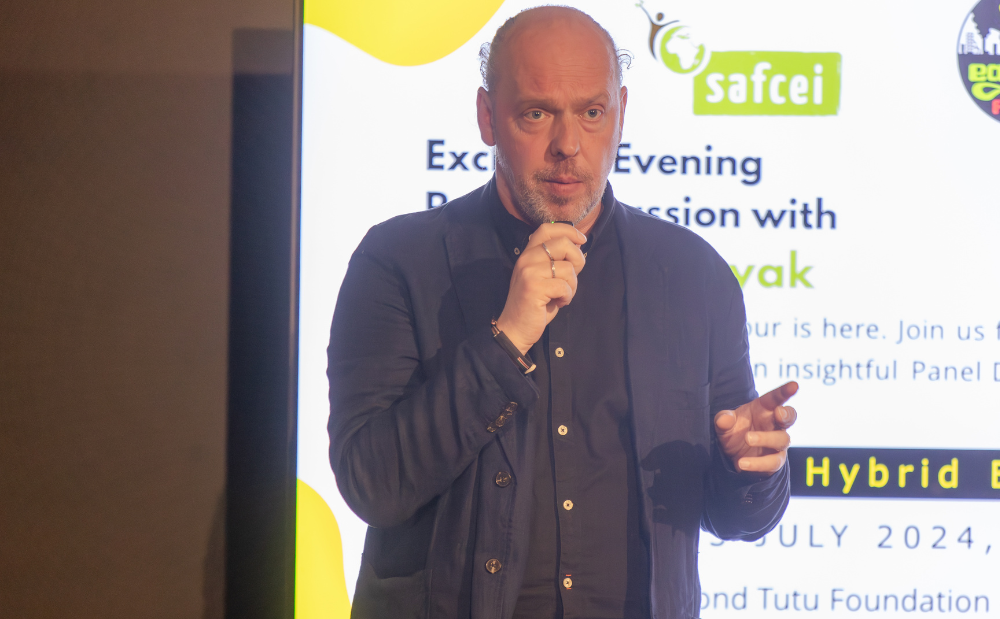Russian eco-defender boosts South Africa's anti-nuclear campaign with timely visit
- Published:

Award-winning Russian environmentalist Vladimir Slivyak of Ecodefense is visiting South Africa for the rest of July. Slivyak, a Right Livelihoods Laureate (known as the Alternative Nobel) is being hosted by the Southern African Faith Communities Environment Institute (SAFCEI) and Earthlife Africa Johannesburg. The organisations say his visit is both timely and relevant for South Africa, especially with recent announcements concerning government plans for procurement of new nuclear energy (2500MW) and the announcement (on Monday 15 July 2024) that the National Nuclear Regulator’s (NNR) has granted Eskom the licence to extend the life of Unit 1 at Koeberg Nuclear Power Station, by a further 20 years, in spite of public safety concerns.
SAFCEI and Earthlife Africa have launched a legal challenge against government’s latest plans to procure new nuclear energy capacity. The organisations say, “We are once again in a situation where it seems that government is not being transparent about its nuclear procurement or following due process, leaving out critical public participation on important decisions about our country’s energy future. We have been here before. And we are reminded how Vladimir risked his own safety, ten years ago, when he found and shared the horrifying, ‘secret’ details of the Russia-South Africa agreement (signed in 2014) to procure 9600 MW of nuclear power (a total of 8 reactors), which was ruled both unlawful and unconstitutional in the High Court. Without his support, we might not have been able to stop the R1-trillion deal, which economists predicted would have bankrupted the country.”
Coming from a country that has been directly impacted by the catastrophic Chernobyl nuclear disaster, Slivyak is committed to empowering grassroots communities – through sharing insights from potentially harmful fossil fuel and nuclear power projects that he has stopped – so that others can do the same in their own countries.
Slivyak says, “Nuclear energy is dangerous, expensive and will not help to save the climate. This is the wrong way for Africa to go because we are in a new era. The 21st century is the time to go with renewable energy, that is where technological progress is today. Let communities produce electricity and connect to the grid. Let people make money from safe energy in a decentralised manner, and many of Africa’s energy problems will be solved.”
The three organisations recently returned from a solidarity visit to Kenya, where a new nuclear power plant is being proposed in Kilifi. For the next two weeks, the group will be on a tour of South Africa, visiting communities in Gauteng and Eastern and Western Cape.
Slivyak says, “In this day and age of climate change and increased conflicts around the world, safe energy must be promoted, and dirty energy left in the past. What could be more obvious?”
SAFCEI and Earthlife Africa say, “This kind of knowledge exchange is critical in our efforts to educate people about the true impacts and implications of nuclear energy. As we are in a climate crisis, which was brought about largely as a result of human behaviour, we must ensure that we choose wisely, as we move forward.”

Who we are

SAFCEI (Southern African Faith Communities’ Environment Institute) is a multi-faith organisation committed to supporting faith leaders and their communities in Southern Africa to increase awareness, understanding and action on eco-justice, sustainable living and climate change.
Featured Articles
-

South Africa: Who Ends Up Paying If DMRE Cooks the Price of Nuclear Power?
-

South Africa’s nuclear energy expansion plans continue to draw criticism, environmental NGOs chew over legal challenge
-

Earthlife Africa and SAFCEI respond to latest unsettling nuclear news regarding the ministerial determination
-

Open Wing Alliance Africa (Virtual) Summit 2023
-

The Green Connection and SAFCEI respond to energy minister's divisive and deflecting comments
-

Job Vacancy: FLEAT Coordinator







